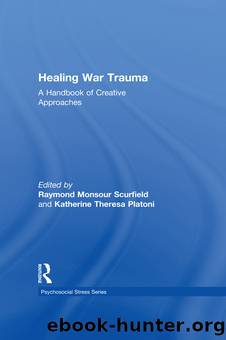Healing War Trauma by Unknown

Author:Unknown
Language: eng
Format: epub
ISBN: 1125275
Publisher: Taylor & Francis Group
Integration of Mindfulness into Psychotherapeutic Approaches
While meditation-based mindfulness practices have existed for thousands of years in various cultures, and Western research into the benefits of this practice for physical health abounds, it is more recent that this approach has been integrated into psychotherapy. Currently, mindfulness practices are part and parcel of a few psychotherapeutic practices: mindfulness-based cognitive therapy, DBT (Dialectical Behavior Therapy), and ACT (Acceptance and Commitment Therapy).
Mindfulness is certainly not yet a standard part of all forms of psychotherapy, but the research base demonstrating it to be an effective adjunct has expanded to include treatment for a variety of psychosocial dysfunctions, such as depression and anxiety (Williams, et al., 2007); obsessive-compulsive disorder (Schwartz & Begley, 2002); and, quite possibly, PTSD (Bernstein, Tanay, & Vujanovic, 2011; Vujanovic, et al., 2009; Walser & Westrup, 2007). Research has shown that the MBSR program developed by Dr. Kabat-Zinn reduces the tendency for rumination about, and emotional reactivity to, thoughts and physical sensations (Ramel, et al., 2004). In fact, due to the impressive literature on the positive benefits of mindfulness practices for various aspects of emotional dysregulation, the VA encourages mindfulness practices as an addition to its repertoire of evidence-based treatments, such as prolonged exposure therapy and cognitive processing therapy (http://www.ptsd.va.gov/professional/pages/mindful-PTSD.asp).
The author sees no reason why mindfulness cannot be practiced in conjunction with any theoretical orientation, whether individualistic (such as psychodynamic, experiential, existential, e.g.), systems (family, feminist, e.g.), or postmodern (solution-focused, narrative, e.g.). Each approach relies upon some aspect of insight, self-awareness, and emotional regulation, all of which have the potential to be greatly enhanced, in terms of therapeutic benefits, by consistent mindfulness practice (Schmeichel & Demaree, 2010). After all, helping our combat veterans really comes down to helping them change thought patterns, reactions to stimuli, behaviors, and relationships with others, as well as with themselvesâwho they are, physically, emotionally, and mentally after returning from war. Awareness of self is crucial for those changes, and mindfulness practices fundamentally increase our awareness of experiences and, thus, self.
Strengthening our awareness of experience as it occurs can improve emotional regulation and cognitive abilities (Moore & Malinowski, 2009). Studies have shown that regular mindfulness practice increases grey matter in regions of the brain associated with memory, emotional regulation, self-appraisal and introspection (Hölzel, 2009; Jha,
et al., 2010).
Download
This site does not store any files on its server. We only index and link to content provided by other sites. Please contact the content providers to delete copyright contents if any and email us, we'll remove relevant links or contents immediately.
Should I Stay or Should I Go? by Ramani Durvasula(7639)
Why We Sleep: Unlocking the Power of Sleep and Dreams by Matthew Walker(6683)
Fear by Osho(4720)
Flow by Mihaly Csikszentmihalyi(4664)
Rising Strong by Brene Brown(4431)
Why We Sleep by Matthew Walker(4419)
The Hacking of the American Mind by Robert H. Lustig(4355)
How to Change Your Mind by Michael Pollan(4338)
Too Much and Not the Mood by Durga Chew-Bose(4319)
Lost Connections by Johann Hari(4160)
He's Just Not That Into You by Greg Behrendt & Liz Tuccillo(3871)
Evolve Your Brain by Joe Dispenza(3650)
The Courage to Be Disliked by Ichiro Kishimi & Fumitake Koga(3468)
Crazy Is My Superpower by A.J. Mendez Brooks(3377)
In Cold Blood by Truman Capote(3365)
Resisting Happiness by Matthew Kelly(3331)
What If This Were Enough? by Heather Havrilesky(3297)
The Book of Human Emotions by Tiffany Watt Smith(3282)
Descartes' Error by Antonio Damasio(3261)
